Note: This is a spoiler-free review of Gen7.
 You and your team wake up from suspended animation on your trip to a distant star. You take command, making sure ship and crew are safe and secure on your journey. All of a sudden, something goes wrong…
You and your team wake up from suspended animation on your trip to a distant star. You take command, making sure ship and crew are safe and secure on your journey. All of a sudden, something goes wrong…
It’s a familiar story that has been told over the years in various forms, both in written and visual presentation – a generation ship off to find a new homeworld for humanity, with danger lurking beneath the surface of the idealized routine. This is the world you are dropped into by Gen7: A Crossroads Game by Plaid Hat Games. Implementing the Crossroads system made famous by the smash hit Dead of Winter, Gen7 drops you into an adventure where you have to work with your crewmates to solve mysteries and achieve goals that threaten your very survival, but have to balance that with achieving your own secret goals. Will you succeed in your goal and deliver humanity to its new home, or will you fall prey to <spoilers> and <spoilers> as you <spoilers>. Hopefully, you <spoilers>!
Gen7 is a semi-cooperative campaign game for 3-4 players that plays between 60-90 minutes, and plays well at either player count.
Gameplay Overview:
Gen7’s gameplay arc consists seven episodes, each which takes place during an individual gaming session. Each player assumes the role of a crew member in charge of a department, each with their own secret goal. The number of game rounds per episode is dependent on both the episode itself and the the choices the players make during gameplay. Each episode is driven by a narrative, with the setup, any special rules and a detailed written description provided. The narrative acts like an automated game master, giving the players instructions as needed.
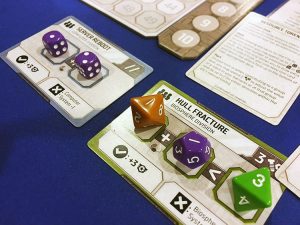
At the beginning of each round, a number of critical tasks are drawn, representing immediate crises that need to be solved by the end of the round, with bonuses and penalties awarded accordingly. Players then roll their pool of dice, with various types of dice representing workers, officers, and robots.
Players place their workers, based on their displayed value, to gather resources, solve critical tasks, draw cards, or gain new dice for future deployment. The key is that there are parameters and limits for which value die can be placed where, depending on the desired action. The critical tasks require specific values of dice in various combinations, such two dice need to sum up to the value of a third, or needing two pairs, while some of the resource gathering sites require an ascending value. Players can also play their own individual tasks and use their workers to complete them.
If one of the players places an Officer die, a Crossroads card is drawn, with its effect triggered based on the game state. If it is triggered, it provides a plot twist to the narrative, having an effect on the way the campaign’s narrative progresses. In the event that there is no trigger, the Crossroads card has no effect.
After the workers are placed and actions resolved, the tasks are checked for success, with points and other bonuses awarded upon completion. Players retrieve their dice, game effects occur based on the episode, and the game continues until the episode’s success or failure condition is reached.
In between episodes, players can earn upgraded powers and abilities, giving their character an element of customization. After each episode, the players can vote on the direction the narrative takes, with many different paths through the storylines available to players. After seven episodes, players will find their narrative journey complete, with happy and sad endings (and everything in between) available based on player choices and the results of the episodes over the course of the campaign.
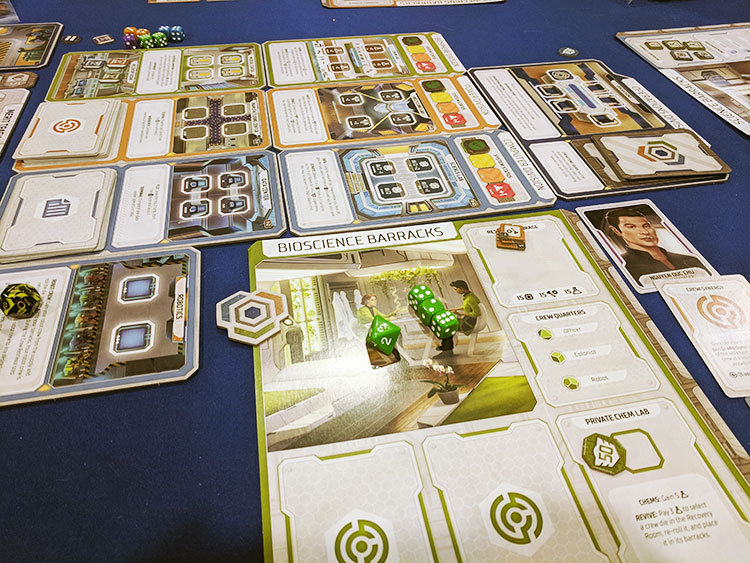
Game Experience:
Gen7 promises quite a bit from jump: an exciting episodic arc with player decisions determining which way the story goes, with Crossroads cards throwing in unexpected twists and turns, and tough decisions based on morality and values potentially putting players at odds. Unfortunately, the game did not deliver at the level that was promised for us. The various episodes and arcs have their themes collated and adapted from a wide range of standard tropes and well-known science fiction stories.
We are not implying that there is any plagiarism or outright theft, but it is easy to see that the developers of Gen7 are into the same stories that we are, and it shows as we were able to accurately predict a significant number of the emerging plot lines. While revisiting narratives is like snuggling up with a warm blanket, familiar and enjoyable, we were let down by the lack of original story.
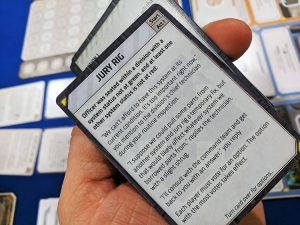
Equally disappointing were the Crossroads cards, on which Gen7 trades the great success of the first game that saw these cards, Dead of Winter. In our entire arc, we only had a very small handful of Crossroads cards actually trigger, and when they did, the “moral choice” that was provided was thin and not terribly engaging. As for game effect, the Crossroads cards only seemed to have an impact on end-of-episode voting for the path our story would take, and even then they seemed very disconnected from that process. It felt as if the designers had an idea for a narrative game, tacked on the Crossroads mechanic to try to harness the success of Dead of Winter, and hoped for the best.
Mechanically, the game is average, at best. A standard worker placement game with dice values determining availability of placement and effect resolution, the game takes very little explaining to a group of experienced gamers regarding how to actually play. The critical task cards add some tension to each turn, with players required to balance both the needs of gathering resources and gaining new workers, all while preventing the critical task from blowing up.
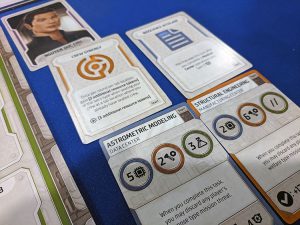
However, outside of these critical tasks and the requirements of the episode, the stakes of success and failure in gameplay are not readily apparent and we did not feel any sense of urgency while playing. This lack of urgency led to a lack of enthusiasm when we were successful with a particular objective. Gen7 simply did not provide the ‘thrill of victory / agony of defeat’ that is so important in games like this. In the end, our plays felt lackluster, like we were just going through the motions to get to the next episode.
The semi-cooperative nature of Gen7 can potentially have a negative impact on gameplay, depending on the players involved. While one group may have success in working together while trying to meet their individual goals, it is certainly possible for gameplay to grind to a halt and for all tasks to be failed if a player decides to play for their own individual private goal. While this may be the “moral choices” that the designers are hoping for, we found that it was not tension that it added to the game but sheer annoyance. However, your mileage may vary, as this might be an attractive feature to some gamers and game groups.
Final Thoughts:
We had high hopes for Gen7 when it first came into our possession. Seven episodes and a narrative arc later, we found a game that was predictable in its storyline, lackluster and unexciting in its gameplay, and did not deliver on its promises and high expectations levied on it. While, mechanically, it is an average worker placement game, this title did just not land for us. If you have a gaming group that loved Dead of Winter and loves science fiction and wants to engage in a narrative campaign, you might want to check Gen7 out, but buyer beware.
Final Score: 2 Stars – Over-promised and under-delivered.
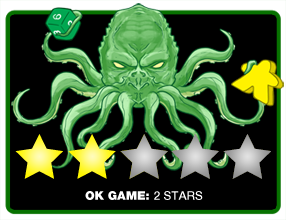 Hits:
Hits:
• Science fiction theme is familiar, yet enjoyable
• Worker placement mechanic easy to explain and understand
Misses:
• Lackluster gameplay devoid of any stakes and urgency
• Narrative arcs are easily predictable and not original
• Crossroads cards do not have any measurable effect on gameplay







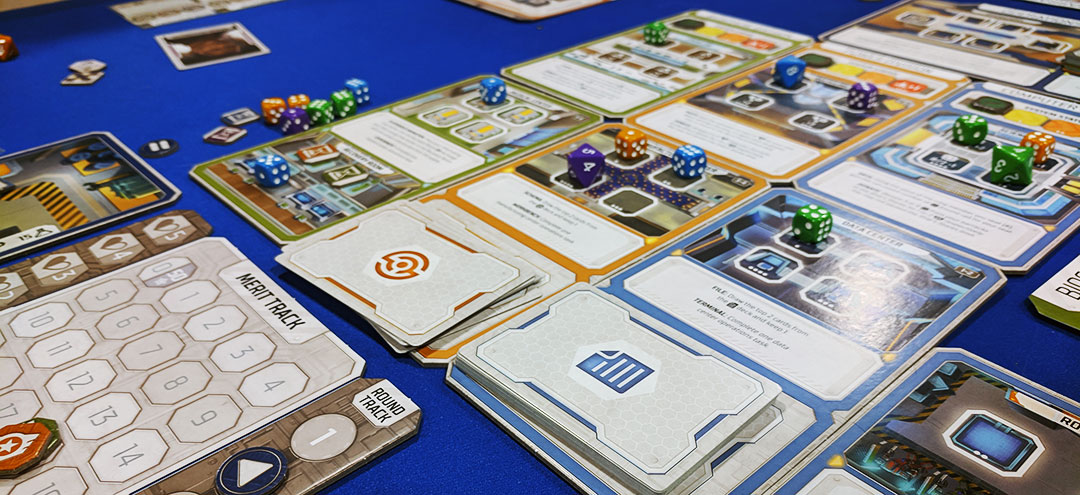















Has you or any of those who’ve played through this run changed their opinion at all since this review?
I certainly haven’t. Alex’s thoughts were spot on in my experience. This title is best left in the bargain bin at the stores.
Our opinion will not change since there’s no way this title is hitting up our table again. One slog through a campaign was more than enough for us.